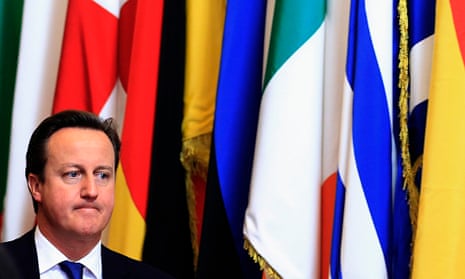Tory divisions over Europe will explode into the open as a senior cabinet minister demands that the government and media do more to make the positive case for EU membership rather than “always looking on the negative side”.
In an interview with the Observer on the eve of the Conservative conference, which opens in Manchester on Sunday, the transport secretary, Patrick McLoughlin, says the economic and business argument for Europe must be “much, much more clearly made” ahead of the in/out referendum on UK membership.
McLoughlin, a former chief whip, makes it clear that while he is often frustrated at the way the EU operates, he is in favour of staying in, partly because Europe would still make rules that would affect this country and much of its foreign trade if it were to leave.
His remarks put him at odds with many of his cabinet colleagues, including the business secretary, Sajid Javid, who told a meeting of the CBI in June that business leaders should not make the case for EU membership before knowing the outcome of David Cameron’s attempts to renegotiate UK membership.
With the issue of Europe set to dominate meetings on the conference fringe, McLoughlin fears that anti-EU voices will dominate the debate. “I am looking forward to a bit more of a conversation about some of the good things that come out of Europe,” he says. “For instance, look at a company like easyJet. It says it would not have existed without what has happened in Europe. I think some of those arguments need to be much, much more clearly put – as to the benefits of our membership of the EU rather than always looking on the negative side.”
While believing reform necessary, he argues that those who think life outside will be rosy are mistaken: “I do not think there is a land of milk and honey, necessarily, in coming out of the EU, but there are some things that have to change.”
Asked whether it was the government’s responsibility to make the pro-EU case, McLoughlin said: “It is not just [up to] government but up to the media to report them.”
With Eurosceptic Tory MPs planning to use the Tory conference to rally more supporters for leaving the EU, the chairman of British Telecom told the Observer he thought it was time for business to speak out. While insisting he fully backs the prime minister’s push for reform, Sir Mike Rake said EU membership kept the UK economy strong: “It would be wrong for businesses to sit out this referendum. It is in the public interest to know how business would be affected were we to leave, as well as the benefits of remaining in a reformed Europe.”
On Sunday Robert Ford of Manchester University, academic analysis of polling data (on theguardian.com) which shows that those arguing for the UK to stay in the EU will be helped, not hindered, if Nigel Farage and Ukip are associated in the public mind with arguments of the out campaign.
A report by the European Council on Foreign Relations – based on interviews with politicians and researchers in all 27 other EU member states – finds that while there is strong support in other EU countries for about a third of Cameron’s reform demands, particularly economic reforms, there is considerable opposition on key proposals to limit migration.Mark Leonard, director of ECFR, says that Cameron is struggling to get his ideas discussed because of successive crises, including that over migration.

Comments (…)
Sign in or create your Guardian account to join the discussion